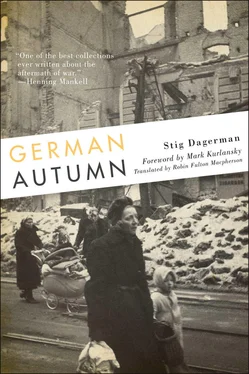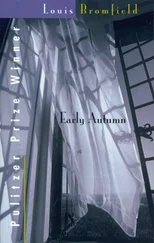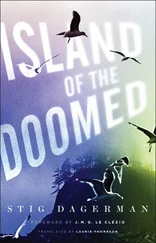Dr Schumacher is regarded even by his opponents as a respectable personality and without doubt he has a kind of honest boldness, yet in his way he embodies the thesis that the German politician’s tragedy is that he is such a good speaker. One gets the impression that Dr Schumacher is seduced by his public, that the bold phrases pouring out of him are a result of an interplay between his own and the public’s feelings rather than of his own carefully considered political experience.
Of course he cannot have avoided noticing that his position is exposed, perilous even, to the extent that he becomes a medium for feelings that are fundamentally not in accordance with the political lines of his party. It would be naive to suppose that they are Social Democrats, those ten thousand in Königsplatz who rejoice when Dr Schumacher apostrophizes ‘the seven million absent comrades’ (the POWs), when he dwells on the shameful Munich Agreement (a most effective thing to dwell on when one has ten thousand listeners with their backs to the very building where it was signed), when he demands the return of the Saar, the return of the Ruhr, East Prussia and Silesia. It is also an illusion, and a more regrettable one, to think that the majority of those ten thousand care one jot for the democratic ideals which Dr Schumacher purposes, among other things, to represent.
The explanation of Dr Schumacher’s successes as a politician and the explanation of why together with Churchill he has taken the place in many doubtful German hearts obviously left vacant at the collapse, is that he has managed to find a common wavelength on which more or less all Germans, independently of their political leanings, can be gathered. The one-sidedness in Dr Schumacher’s political preaching makes it acceptable also to Germans who have not yet overcome their Nazism and do not really want to overcome it either. If we accept the reasonable supposition that Dr Schumacher’s case is one where a public seduces a much too clever talker then the phenomenon shows itself here in Munich in the way in which, right from the start, the speaker fends off any kind of objection on the part of his public, that is, stubbornly concentrates on those territorial injustices which even the most indifferent German mass must find disturbing. Only once does a small protest roll up from the sea of heads. It comes from a Communist who wants to let the Russians keep East Prussia.
‘It’s me they’ve come to listen to, not you,’ replies Dr Schumacher with cross humour and gets nine thousand seven hundred laughers on his side.
Dr Schumacher is without doubt good for his party, but the question is whether he is too good, that is, dangerous — dangerous not primarily because of his views, which are not just his own but are expressed with equal openness by Neumann in Berlin, by Paul Lobe and by other Social Democrat leaders, but most dangerous because of his enormous popularity, which will perhaps win election victories for his party — but what kind of victories?
It can be seen as a pious and risky piece of self-deception when German Social Democracy presents its electoral progress as proof that democratic attitudes are on the increase in the German people. Among those who vote for the Social Democrats there are still a considerable number who are without doubt captivated by the idea of asserting German nationalist views by way of voting for a democratic party and such a supposition is confirmed by the important difference between the voting figures for the parties and their real strength. It is worth remembering that in an average German city while the ratio of Social Democrat figures to those of the Communists is six to one, that between their respective memberships is more like three to two.
When his speech is finished one notices how helpless this tall, fragile man with the sad face really is. The speech has supported, the speech has warmed him, now suddenly he sinks, and someone comes and wraps a scarf round his neck and helps him on with his overcoat. Alone, he makes his way through the crowd towards his car. People call greetings to him which he ignores. People storm him with questions which he does not answer. He is due to travel to England next day and someone shouts ‘Don’t forget to say that in London too, Dr Schumacher!’ Dr Schumacher nods but does not smile. Dr Schumacher generally does not smile — Dr Schumacher who has won the confidence of a whole people through smiling as little as possible, Dr Schumacher who has given so many Germans the chance of voting democratically without their needing to be democrats, while indeed being quite the opposite. Dr Schumacher has of course not chosen this, but his frontier propaganda, in many ways reasonable but ideologically much too superficial, has had this result.
This most gifted of contemporary German politicians, who at the same time is the one with the cleanest hands, can hardly be accused on account of his views on the injustices committed against Germany by the Allied politicians: paralysing production through badly organized dismantling schemes; giving Germans charity in the form of provisions instead of helping peacetime production to its feet and thus giving Germans the chance of paying for their imports; using POWs for forced labour, which breaks the Hague Convention and is a highly unsuitable way of teaching the German people to respect it in the future; imposing the strikingly rigid frontier regulations that threaten vital German interests. If a German socialist who suffered more or perhaps longer under Nazi-German oppression than the socialists of any other country should express such thoughts, that is no more unjustifiable than is the case when for example an English liberal like Gollancz offers to interpret them.
What can be held against Dr Schumacher is that through his doomsday sermons against the victors he adopts a limited national perspective instead of a socialist and internationalist one. It can be objected that there are justified national claims which have nothing to do with nationalism or chauvinism. But hasn’t the German fate demonstrated how the dividing-line between propaganda for national interests and the rancorously manifested nationalism of Nazi Germany is one that seems to exist in order to be crossed? Should it not be a part of a democratic training to teach the otherwise rare art of keeping that line uncrossed? It can also be held against Dr Schumacher that he cultivates a type of propaganda which is only too easily received by German nationalists. Give them a dose of socialism, democracy and internationalism — and Dr Schumacher will be less popular but more fitted to speak for the new-born democracy.
Through the Forest of the Hanged Boys
The forests heal their wounds more quickly than anything else. Here and there, of course, among the oaks there is an unemployed field-gun whose broken barrel stares morosely at the ground as if ashamed. The shells of small brown cars lie on the slopes like huge food-cans. Untidy camper-giants have been moving in a hurry through these the most assiduously well-managed of the world’s forests. Still, the war has made its way most considerately between the trees and through the little villages: the latter experienced the bombing of the cities only as a kind of red aurora at night and felt the ground tremble and doors and windows rattle. The occasional house was, naturally, knocked out by mistake, and at this point the local tragedy would be concentrated. In the small village by the Weser it was a dentist’s house that was hit one spring morning during surgery hours and the dentist, the nurse and all thirty patients were killed. Out in the garden a man was walking to and fro waiting while his daughter had a tooth pulled inside the house, and in the waiting-room sat his wife and his mother, who had also accompanied the girl to the dentist’s so that she would not feel afraid. The man escaped as by a miracle but his whole family was lost, and for the past couple of years he has been going round the village like a wandering Second World War memorial — the First World War memorial is to be found in a little grove between the bank of the Weser and the first house and is still the pride of the village.
Читать дальше












